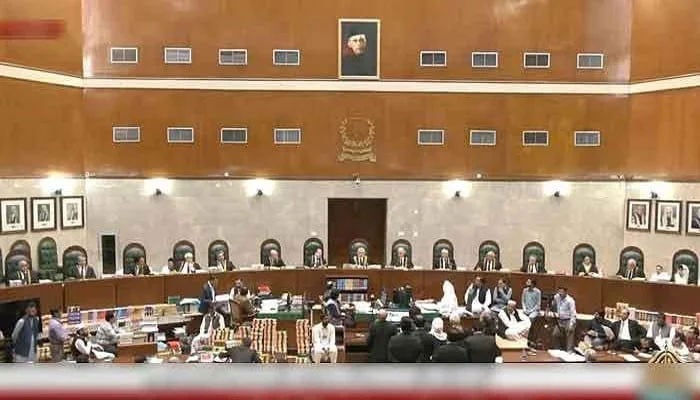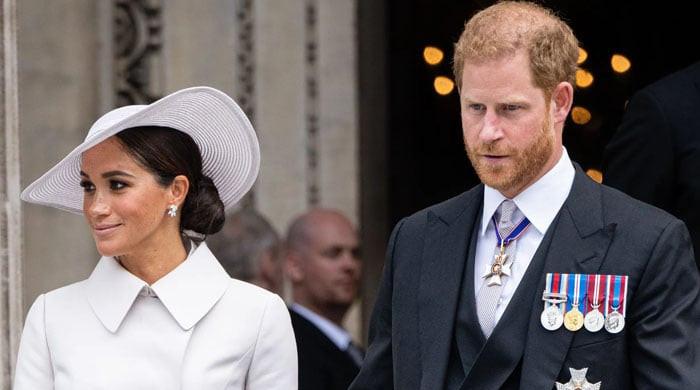The Supreme Court docket of Pakistan is listening to the petitions in opposition to the Apply and Process Act as we speak.
The complete courtroom is listening to underneath the chairmanship of Chief Justice of Pakistan Qazi Faiz Isa.
Justice Sardar Tariq Masood, Justice Ijaz Ul Ahsan, Justice Syed Mansoor Ali Shah, Justice Muneeb Akhtar, Justice Yahya Afridi, Justice Aminuddin Khan, Justice Syed Mazahir Ali Akbar Naqvi, Justice Jamal Khan Mandukhel, Justice Muhammad Ali Mazhar, Justice Ayesha A Malik, Justice Athar Minullah, Justice Syed Hasan Azhar Rizvi, Justice Shahid Waheed and Justice Musrat Hilali are included within the full courtroom.
The proceedings of the listening to are being telecasted stay.
Remarks of the Chief Justice earlier than the arguments of the Lawyer Common
Earlier than the arguments of the Lawyer Common, the Chief Justice remarked that you’re the final however not the least.
The Lawyer Common whereas giving arguments stated that I’ve argued that the case is admissible, three questions have been raised which I’ll reply, I’ll speak about Article 191 and the independence of the judiciary, on the query of Parliament being the Grasp of Roster. I’ll give arguments, I’ll give arguments on the best of attraction, I will even give arguments on the query of attraction in opposition to the choice of the Full Court docket, the basic rights enumerated in Articles 14, 20, 22 and 28 are exercised in accordance with regulation, proper. To privateness is regulated by regulation, Article 191 offers Parliament the ability to legislate.
The Chief Justice requested the Lawyer Common whether or not you might be saying that the phrase regulation in Article 191 is totally different from using this phrase in the remainder of the constitutional clauses.
The Lawyer Common replied that the Excessive Treason Act and the Proper to Data Act derived their legislative authority from constitutional provisions, in these Acts Parliament had not relied on the Federal Legislative Checklist, since no modification to Article 191 had been made. No, the non-amendment of Article 191 is to make sure the independence of the judiciary.
Justice Muneeb Akhtar requested the Lawyer Common that in accordance with the 1956 Structure, the foundations have been authorised by the President or the Governor Common. In accordance with you, Parliament is allowed to vary the foundations. Why Parliament didn’t approve the foundations of the courtroom?
The Lawyer Common stated that the non-exercise of the ability can’t be understood to imply that the ability of the Parliament has lapsed. The identical follow and process regulation was made.
Justice Ijaz-ul-Ahsan stated that the independence of the judiciary has been affected by the Apply and Process Regulation. If the phrase “regulation” is used 200 instances within the Structure, will it have the identical that means?
The Lawyer Common replied that the regulation is both Parliament made or decide made regulation.
Justice Muneeb Akhtar stated that Article eight states that there can’t be any laws which takes away basic rights.
The Lawyer Common stated that underneath Article 191 Parliament has the ability to legislate, Parliament can’t legislate in opposition to the independence of the judiciary.
Justice Ijaz-ul-Ahsan stated that the actual query is the independence of the judiciary.
Justice Jamal Mandukhel questioned whether or not this act is decreasing or rising the independence of the judiciary.
The Lawyer Common stated that the precept of separation of powers, I’ll reply these questions in arguments on the factors of independence of the judiciary, follow and process aren’t in opposition to the independence of the judiciary.
Justice Athar Minullah stated that Mr. Lawyer Common these phrases aren’t solely regulation however topic to regulation.
Justice Muneeb Akhtar stated that Article 191 is totally different and the remainder of the articles you might be referring to are totally different, the articles you have got referred to are basic rights.
The arguments of the petitioners on the earlier listening to are full
It ought to be famous that the arguments of all of the petitioners and political events have additionally been accomplished, all of the political events besides PTI supported the Act.
The Supreme Court docket Bar Affiliation opposed the Act whereas the Pakistan Bar supported it.






